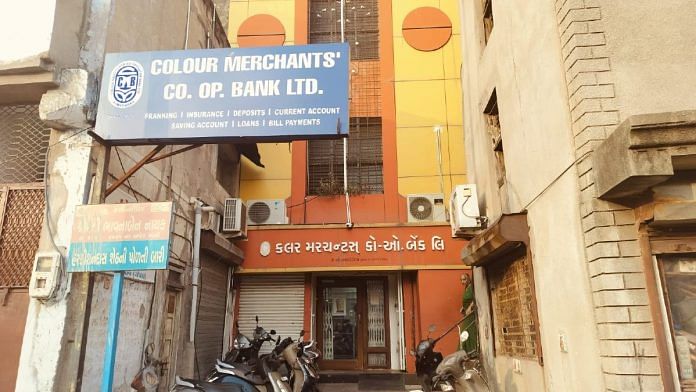Ahmedabad: In May 2022, said Hardik Patel, a 35-year-old contractor, his mother, younger sister and he fell at the feet of officials from the Colour Merchants Cooperative Bank, who had arrived at their home to evict them.
The bank officials, Patel said, told the family that they had taken possession of their house over a Rs 34 lakh loan that the contractor “had failed to pay back”. But here is the catch: While he did apply for a loan, Patel claims he never got a penny from the bank.
Patel is among dozens of victims of an alleged scam orchestrated by officials of the Ahmedabad-based Colour Merchants Cooperative Bank. So far, seven FIRs have been filed across police stations in Ahmedabad by loan applicants who claim they were defrauded by the urban cooperative bank.
Police officials say over 100 people have sent complaints to the commissioner’s office, levelling similar allegations.
One borrower, a 35-year-old mechanic named Sandeep, allegedly died by suicide on 14 December, and his brother has blamed bank officials in his complaint.
Most victims say they applied for loans against property with the bank in 2018 and 2019. However, they claim they were not intimated when the loans were sanctioned. Soon after the money was credited to their accounts, the borrowers say, their accounts were fraudulently drained through security cheques they had given to the banks at the time of the loan application.
Multiple bank statements of borrowers reviewed by ThePrint showed large sums of money withdrawn from accounts in a short period of time.
Hardik Patel said he had applied for a Rs 34 lakh loan in August 2019. The amount, his bank documents show, was transferred to his account on 8 August 2019. However, Patel said he didn’t receive any intimation on his phone from the bank.
“Not only did I not receive any messages, the bank had recorded some other phone number, so all the information was going there,” he told ThePrint.
Between 8 August 2019 and 29 November 2019, Patel’s bank account was drained completely through various RTGS (real-time gross settlement), a specialised mechanism for instantaneous high-value transactions, and cheques.
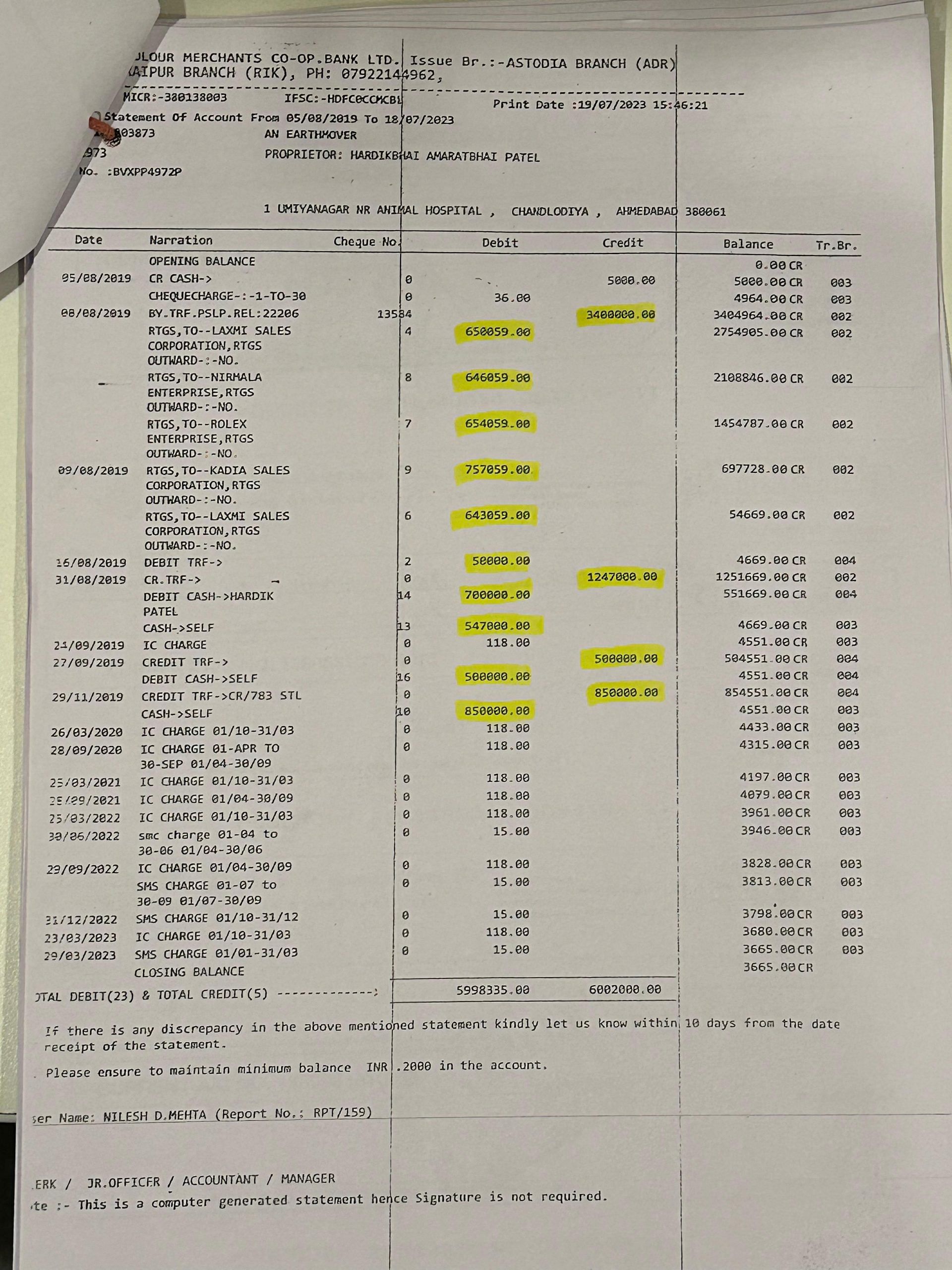
Patel claimed he was in the dark about it until July 2020, also noting that three other suspicious transactions (money credited) were made in his account until November 2019. On 11 July 2020, he filed a police complaint “but nothing came of it”.
Nitin Rajguru, who has a catering business in Ahmedabad, said he had an ongoing Rs 65 lakh loan with the bank when he was offered a top-up in November 2019, which he refused.
“Then, one day, I got a call from the bank that the RBI has put up a query on my collateral. So, I was told I had to sign mortgage papers again. The call was from Atul Shah, the manager (of a satellite branch), so I didn’t have any reason to be suspicious. Kinnar Shah (general manager of the bank) also informed me of the same in person,” Rajguru said.
For some time, he continued to pay his instalments, and took a moratorium of three months during Covid. In the middle of 2020, he said he started getting recovery calls and got confused.
“I was paying my EMIs regularly, and didn’t quite understand what was happening. In July 2020, I went to the bank and got my hands on my account statement. I learnt that a fresh loan of Rs 55 lakh was deposited in my account. It was money that I had never asked for, and money that I never got my hands on,” Rajguru claimed.
According to Rajguru’s bank statement, on 28 November 2019, Rs 55 lakh was deposited in his account. Between 29 November and 23 January, this amount was drained through RTGS and cheque transactions.
Rajguru said he never made these transactions, and had no knowledge of them either.
Sources in the Ahmedabad Police Economic Offences Wing (crime branch) said they had found that Rajguru’s signatures had been faked, adding, however, that the forensic reports were pending.
The bank officials even faked his I-T returns, said a police officer privy to the investigation. “The bank officials faked over 100 I-T returns,” the officer said.
ThePrint reached the Deputy Commissioner of Police (Crime) (EOW) for a comment and was directed to the police inspector concerned, but no response could be obtained.
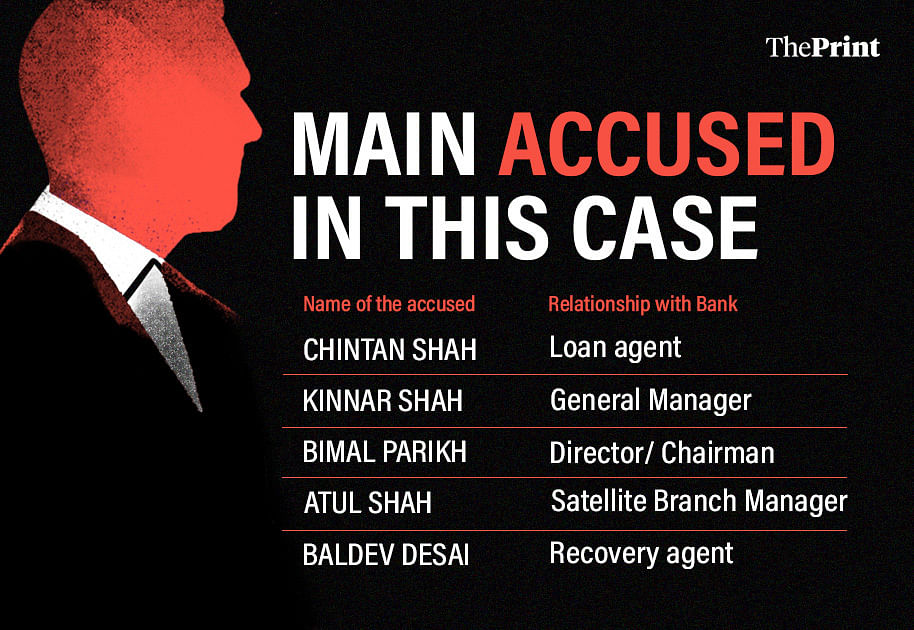
Currently, the bank doesn’t have a functional management. There is no information on officebearers on its website. ThePrint contacted all the accused via phone calls, and left inquiries over WhatsApp, but couldn’t get a response. The phone numbers of Atul Shah and Kinnar Shah were switched off.
Set up in 1971, the Color Merchants’ bank is also currently under RBI restrictions over its “deteriorating financial condition”.
Modus operandi
The alleged modus operandi in all cases has been similar. Small businessmen looking for a loan got in touch with a middleman by the name of Chintan Shah, and approached Colour Merchants Cooperative Bank for a loan against property.
They mortgaged their houses and the bank kept some blank signed cheques with itself as security.
Signing over blank cheques to banks is a practice that often occurs where no collateral is available for a loan.
However, as stated earlier, the loan amount disbursed to the borrower’s account was subsequently withdrawn as well.
Patel independently traced the trail of money in his case. The amount stolen from his bank allegedly went from one account to another before finally ending up in the account of bank proprietor Vishwa Khanna, who died of Covid in 2020. Patel claims the money trail was shared with him by a bank official.
In many cases, loan amounts were transferred from one borrower’s account to another’s. This was explained as ‘kite flying’ by experts in the urban cooperative banking sector. “This is one way of reducing your non-performing assets in the books. It’s called ‘kite flying’. Transfer amount from one account to the other,” one expert said on the condition of anonymity.
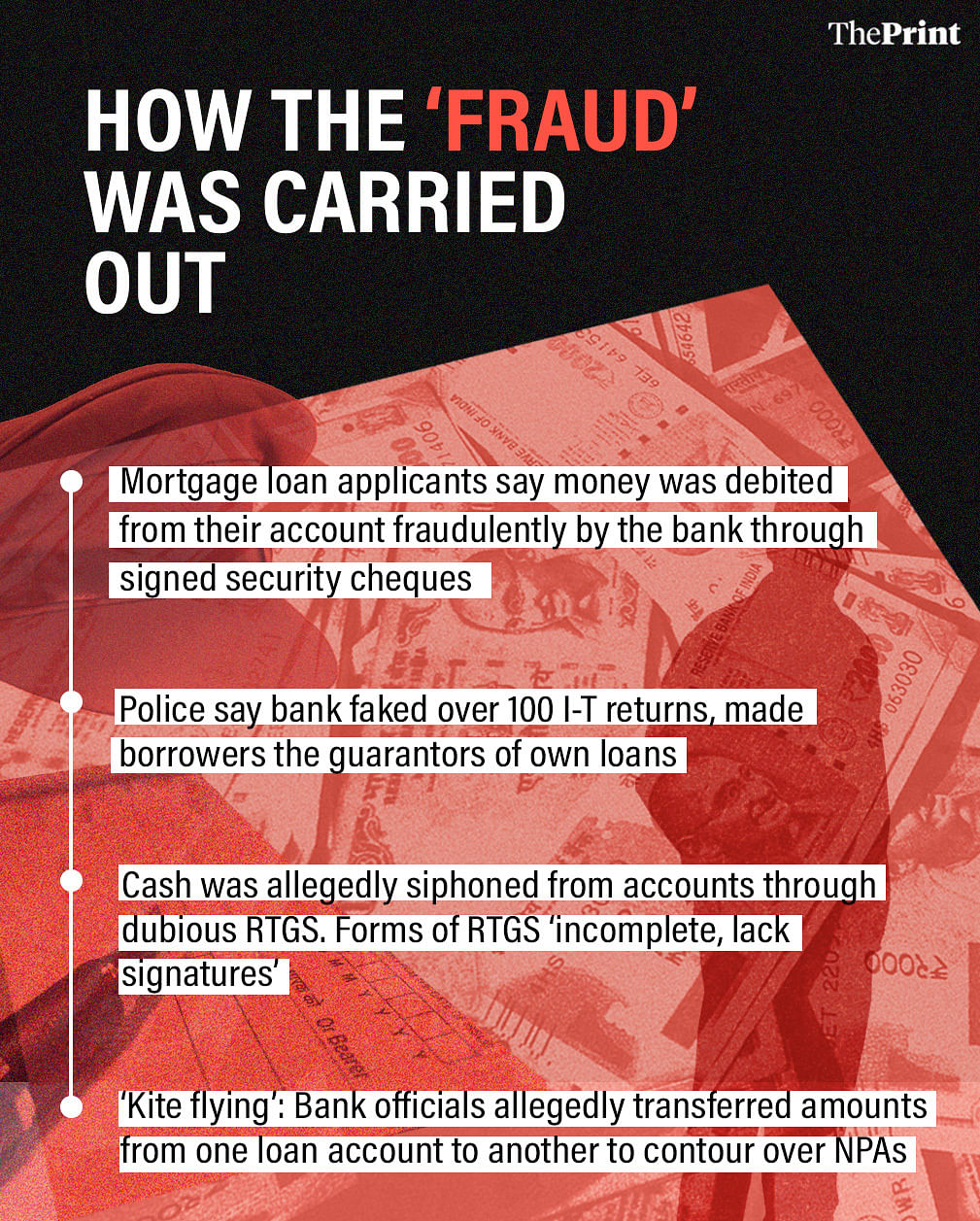
In the meantime, Patel was running around trying to get his hands on his bank documents — he said he didn’t even get a copy of his passbook. “I ran from pillar to post to get an FIR registered but nothing came of it. I sent 50 complaints to the police but the FIR in my case was registered only in January 2023,” Patel said.
One of the RTGS transactions from Patel’s account has gone through without his signature in it, RTGS forms obtained by ThePrint show.
“I had given cheques of Axis Bank as security to the bank. When they (Colour Merchants Cooperative Bank) used one of those cheques to withdraw EMIs, I got a notification from the bank and learnt that I had been defrauded,” Patel said.
All the victims that ThePrint spoke to had fallen for the scam in late 2019 and early 2020, and said it took them half a year before they realised it.
A police officer from EOW, speaking about the Rajguru case in particular, said “Bimal Parikh used to observe the entire operation”.
“The main loan sanction form had his signature, and Chintan Shah used to get a commission,” the officer added.
Chintan Shah is an accused in the case. When ThePrint reached his number, the person at the other end said “wrong number” and hung up after this reporter introduced herself.
In some cases, the guarantor of the loan was the borrower himself, the police officer said.
Talking about the money trail, the officer said a part of the money siphoned off from Rajguru’s loan account went to Jignah Kinnar Shah, the wife of Kinnar Shah, general manager of Colour Merchants Cooperative Bank.
The officer said Chintan Shah would get a cut of Rs 40,000-50,000 for every loan sanctioned in such a manner. “We have also found a cheque of Rs 10 lakh issued in his name,” the officer added.
‘No will to live’
Lawyers and judges were shaken in the Gujarat High Court in June 2023 after Patel, along with three others, stood up in the courtroom and started drinking phenyl.
“They took everything from me. I knocked on all doors possible — government, police, judiciary… But no help came,” Patel said. “So, I thought it best to take my life.”
The four people who drank phenyl in an attempt to end their life that afternoon were Jayshree Panchal, her husband Shailesh Panchal, Hardik Patel and Manoj Vaishnav.
The case of Jayshree Ben, also allegedly defrauded by Colour Merchants Bank, was the first in which an FIR was lodged.
The four attempted suicide because the court had decided to give anticipatory bail to Chintan Shah, Bimal Parikh, Atul Shah and Kinnar Shah.
It is only after this incident that the Gujarat administration sprang into action. FIRs were registered on police complaints that had been stuck in the pipeline for years.
The “victims were invited by ministers to meet them and empty promises were made of justice”, Rajguru claimed.
As things stand, charge sheets have been filed in two of the seven FIRs, in Rajguru’s and Patel’s cases.
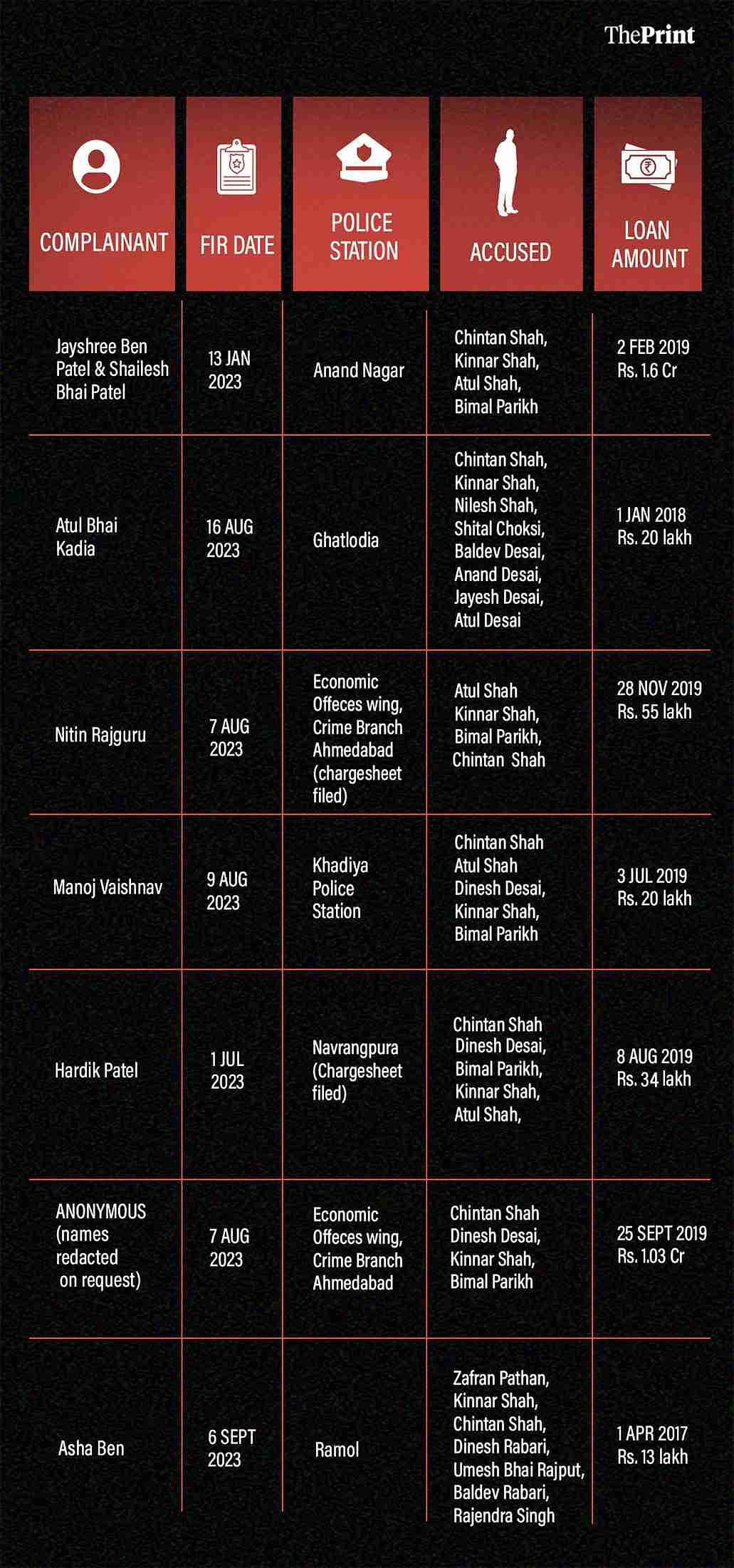
Urban cooperative banks have been beeping on the Reserve Bank of India’s radar for extending loans to relatives, and other violations. The reports of Colour Merchants going under and defrauding its customers are a malaise in the larger disease gripping the urban cooperatives of Gujarat, which came under RBI scanner only two years ago.
ThePrint has earlier reported how urban cooperative banks are the centre of political power in Gujarat. Victims allege that it was because of political backing to people associated with Colour Merchants that they had to struggle for their complaints to be heard.
Police Inspector Vallabh, the investigating officer of Patel’s case, refused to comment on the investigation, “I don’t remember any details. Get the charge sheet from court,” he said.
Also Read: RBI must regulate risky loan apps, cooperative banks. They are plaguing the banking sector
‘Completely lost hope’
In December 2021, Gujarati daily Sandesh Newspaper carried an interview with AtulBhai Kadia, a labour contractor who was reportedly being harassed by recovery agents from Colour Merchants Bank to pay off his debt.
Kadia had applied to top-up an ongoing loan of Rs 20 lakh in February 2018, but claims he never got the money. But he did get recovery agents knocking on his door, abusing and threatening him every other day.
“In 2021, my father who was struggling with cancer was hospitalised. Two agents from the bank (Colour Merchants) came to the hospital to recover the money, I wanted them off my back so paid them Rs 1.34 lakh cash, but didn’t get a receipt in return. I subsequently approached a reporter in Sandesh Newspaper, who interviewed me. It is after the article that I realised others have been duped in a similar fashion,” he told ThePrint.
After the December article, many customers of Colour Merchants Bank got together and formed WhatsApp groups to figure out their next steps.
Kadia said after all these years of going to the police, bank branches, he still doesn’t have access to his bank documents like a passbook.
“I don’t have my bank debit card, chequebook, passbook, nothing. I have even filed RTIs to get access to my documents but they too have been rejected,” he added.
Fear of going homeless
ThePrint spoke to several complainants in Ahmedabad, who had either been stripped of their property or had been threatened with it.
Possession of Patel’s house was taken on 25 May 2022 by the bank. Within two weeks, it was sold and auctioned, with Patel saying that he didn’t even get the right of redemption, which seeks to return a property to its original owners if they are able to arrange the funds.
“Even though I had been wronged, I was willing to pay some money to ensure I continue to stay in my house. I was willing to pay Rs 5 lakh to the bank so I am not kicked out, but they didn’t listen to me, and asked me to pay them Rs 60 lakh,” he said.
“I didn’t even get a chance to get my belongings. The new owner is using them,” Patel said.
Other borrowers have also received notices under relevant sections of the SARFAESI Act — which allows banks to auction properties to recover loans — but possession has not been taken from them yet.
“Even my 4-year-old often asks me if the house will be taken from us, he’s scared of losing his house. My wife, my parents… all ask me if the house will be gone and what I am doing about it. It’s depressing and frustrating,” said Vaishnav, who has a business called Ved Homes Realty and applied for a loan of Rs 20 lakh from Colour Merchants in August 2019.
His bank transactions, accessed by ThePrint, show an amount of Rs 20 lakh was credited to his account on 31 August, and the account was drained on the same day in two transactions of Rs 7,48,000 and Rs 12,47,000.
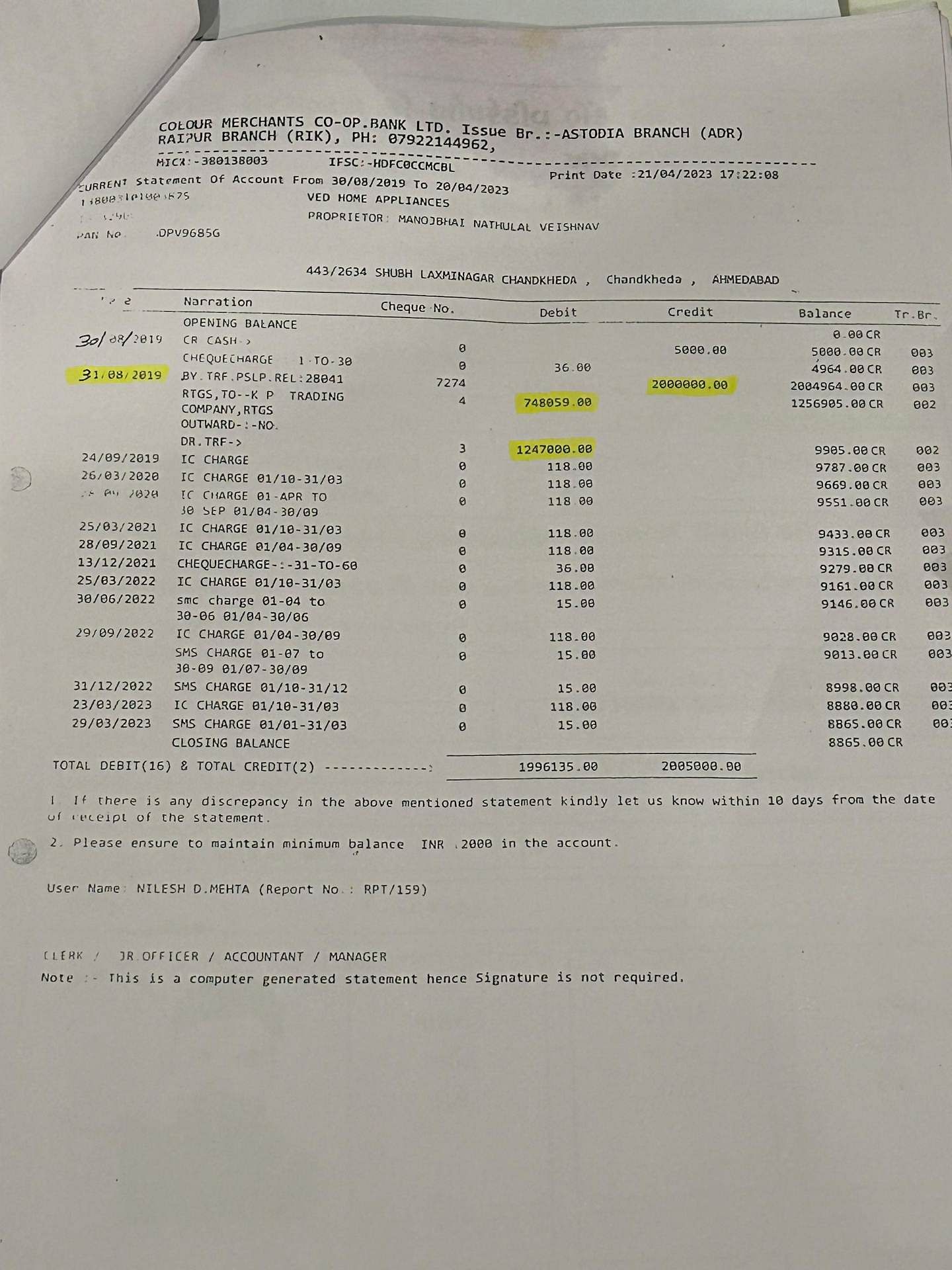
The RTGS form for the transactions, accessed by ThePrint, doesn’t even carry Manoj’s signature. “How can an RTGS transaction go through without my name or signature on it?” he asked.
All the affected parties said they have challenged their possession notices at the Debts Recovery Appellate Tribunal, where their cases are ongoing.
In this murky situation, the news coming out of Colour Merchants Bank has dented the already dampening image of urban cooperatives in Gujarat, whose depositors have shrunk by over nine lakh since 2002, according to data from Gujarat Urban Cooperative Banks Federation.
“The nationalised banks offer easy loans now. They also have better technology to offer citizens and the money there is considered safe. So people are not preferring putting their money with urban cooperatives anymore,” a member in the state liquidation department said.
For now, the depositors at Colour Merchants Bank wait for justice. “I just want my son to sleep peacefully, knowing he won’t be thrown out of his house,” said Vaishnav “Especially when I have not done anything wrong.”
(Edited by Sunanda Ranjan)
Also Read: Politics, influence, caste — the murky loan dealings of Gujarat’s cooperative banks


